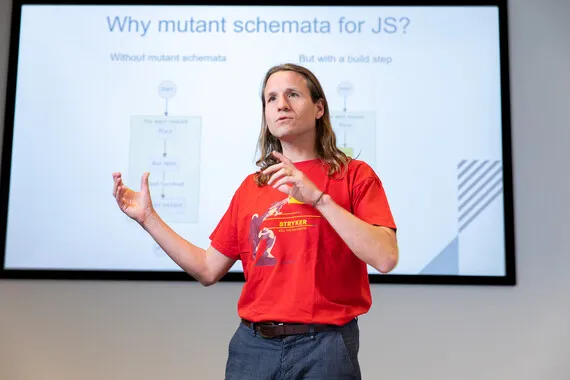training
TypeScript Development
Leer onderhoudbare JavaScript applicaties ontwikkelen met TypeScript.
Beschrijving
We ontwikkelen vandaag de dag steeds grotere JavaScript-applicaties. Helaas is deze taal hiervoor niet erg geschikt. Daarom gebruiken we TypeScript. TypeScript helpt door JavaScript uit te breiden met een typesysteem. Als gevolg hiervan kun je fouten eerder detecteren en profiteren van betere tooling. Dit alles leidt tot een hogere efficiëntie en codekwaliteit.
In deze training leer je de basis van TypeScript, inclusief primitive types en functions. Vervolgens maak je kennis met meer geavanceerde concepten, zoals literal types, interfaces en generics. Tot slot wordt je expert in je begrip van 'structural typing' door gebruik te maken van mapped types en conditional types.
Er is voldoende tijd om te oefenen, want je implementeert deze concepten in een applicatie die je vanaf de grond opbouwt.
Wist je dat:
false === trueeen compile error is?- interfaces niet bestaan in JavaScript?
publicenprivateeen mythe zijn?- een class een andere class kan implementeren (
implements)? - een interface een class kan uitbreiden (
extends)? - het definiëren van een class twee dingen doet?
- TypeScript geen type-safe taal is?
- er een type bestaat met de naam
never? - TypeScript support biedt voor exhaustiveness checking?
- je een for-loop kan schrijven in een type?
- je een ternary expressie kan gebruiken in een type definitie?
- je een type kan definiëren met behulp van een template literal?
Leerdoelen
Deze training behandeld de volgende leerdoelen:
Benodigde voorkennis
Kennis van JavaScript
Onderwerpen
- Introduction
- Getting started
- Types
- Variable declaration
- Functions
- Interfaces
- Classes
- Generics
- Structuring code
- JavaScript interop
- Compiler
- Advanced types
- Advanced use cases
- Async/await
- Mapped types
- Template literal types
- Decorators - if time permits
- JSX Support - if time permits
Introduction
In this chapter, you will learn the context in which to place TypeScript. Goals:
- Learn how TypeScript relates to JavaScript.
- Know what "type-safety" means and how it relates to TypeScript
- Learn to use TypeScript in a regular JavaScript file.
Getting started
In this chapter, you will learn how to create a plain TypeScript application. Goals:
- Learn the basics of a NodeJS project.
- Learn the basics of
tsc(typescript compiler) - Know how to run an application in nodejs
- Know how to debug a TypeScript application.
- Learn some basic compiler options.
Types
In this chapter, you will learn how to declare and use primitive types in a TypeScript file. Goals:
- Know the primitive types.
- Understand what
anydoes and why not to use it. - Learn to use
--noImplicitAny - Learn to use
--strictNullCheck - Know the difference between
nullandundefined. - Learn what literal types are.
Variable declaration
In this chapter, you will learn the different ways to declare a variable in TypeScript. Goals:
- Know the difference between blocked scope and function scope.
- Learn to use
constandlet.
Functions
In this chapter, you will learn the different ways to define and use functions and some related ES features. Goals:
- Learn to use functions in TypeScript
- Learn to use some recent additions to JavaScript, like spread operator and destructuring.
- Understand what
thispoints to inside a function. - Know the difference between function expressions and arrow functions
Interfaces
This chapter will dive into the heart of the type system: define the shape of objects with interfaces. Goals:
- Learn what a 'shape' is and how to name one.
- Learn the different ways to modify properties.
- Know how to use index accessors.
- Learn what a method shape is.
- Learn to use overloading in interfaces.
Classes
In this chapter, you will learn all there is to know about classes in TypeScript. Goals:
- Learn to use classes.
- Know the difference between private, public, protected, and ES private.
- Learn how to use prototypal inheritance.
- Learn how to use properties and when (not) to use them.
- Know to associate types with classes and class instances.
- Learn to love
--strictPropertyInitialization. - Know how to use method overloading.
- Learn what
thispoints to inside a class body.
Generics
This chapter dives into generic type argument. Goals:
- Learn what a generic type argument is and why they are usefull.
- Learn to use type constraints.
- Learn to prevent a death by a thousand overloads using spreading parameter types.
Structuring code
In this chapter, you will learn how to scale your TypeScript application across multiple files.
- Learn the two ways to structure code in TypeScript
- Learn what a "module" is.
- Know the different output modes for modules.
- Know how to consolidate multiple modules into one.
- Know how to avoid some pitfalls with ES modules.
JavaScript interop
In this chapter, you will learn how to use JavaScript code from TypeScript. Goals:
- Learn how to import and use JS code.
- Know what a declaration file is and how to use them.
- Understand how type-resolution works.
Compiler
This chapter showcases useful compiler options, and introduces you to project references. Goals:
- Know how to include and exclude TypeScript files.
- Know all the essential options and strictness options.
- Understand when to use project references.
- Learn to split a program into multiple projects with project references.
Advanced types
This chapter showcases advanced type concepts. Goal:
- Understand the concept of "type compatibility"
- Learn to combine types with unions and intersections.
- Learn to name types with an alias
- Know the concept of a "type query".
- Learn to love the
unknowntype. - Learn to perform type assertions and type guards
Advanced use cases
In this chapter, you will combine some advanced concepts of the previous chapter into use cases.
- Learn to create and use a discriminated union.
- Learn what the
nevertype is and why it s usefull - Learn to create an exhaustive check
Async/await
In this chapter, you will learn the concept of "Promises" in JavaScript and what TypeScript adds to this. Goals:
- Know the concept of "delayed work."
- Learn to work with promises
- Understand what
asyncandawaitdo to your program. - Learn to use promises in the wild.
Mapped types
In this chapter, you will learn to define for-loops and if-statements inside TypeScripts type system. Goals:
- Know what a "lookup type" is.
- Learn how to create a simple mapped type.
- Know the build-in mapped types.
- Know what a conditional type is.
- Learn where conditional types can be helpful.
Template literal types
We end with a grand finally: defining and using template literals inside the type system. Goals:
- Know what a template literal type is
- Understand how to create a 'stringly typed' yet type-safe API.
- Know some basic string manipulation in the type system.
Decorators - if time permits
JSX Support - if time permits
Planning
| Startdatum | Duur | Locatie | |
|---|---|---|---|
3 maart 20254 maart 20255 maart 2025 | 3 dagen | Utrecht / Remote Dit is een hybride training die remote gevolgd kan worden. Meer informatie Utrecht / Remote Dit is een hybride training die remote gevolgd kan worden. Meer informatie Utrecht / Remote Dit is een hybride training die remote gevolgd kan worden. Meer informatie | Inschrijven |
7 april 20258 april 20259 april 2025 | 3 dagen | Veenendaal / Remote Dit is een hybride training die remote gevolgd kan worden. Meer informatie Veenendaal / Remote Dit is een hybride training die remote gevolgd kan worden. Meer informatie Veenendaal / Remote Dit is een hybride training die remote gevolgd kan worden. Meer informatie | Inschrijven |
Incompany of persoonlijk advies nodig?
Onze opleidingsadviseurs denken graag met je mee om een persoonlijk advies te geven of een incompany training binnen jouw organisatie te vinden.
Trainers
Voorkennis trainingen
"Zeer prettige docent, gaf op een eigen manier een zeer goede invulling aan de cursus. Was prettig om zo de cursus te volgen."Marieke
-
Hoge waardering
-
Praktijkgerichte trainingen
-
Gecertificeerde trainers
-
Eigen docenten







